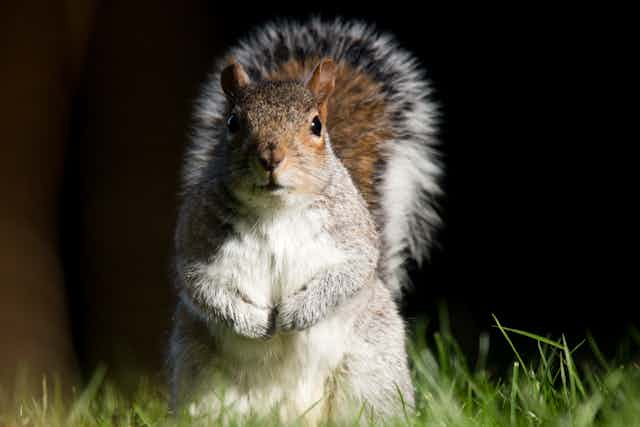Furry, fast, occasionally chubby. Small, whiskered, bushy tailed. An expert climber. A nut eater. And grey.
For those in the UK, everything was going great until that last trait. You were probably thinking “cute” and “cuddly”, and feeling positive about this mystery mammal. Until you discover it is the grey and not the red squirrel.
Grey squirrels are a contradiction. They have all the characteristics of animals that people tend to love, and yet they are actively persecuted by humankind. BBC presenter Chris Packham calls them Britain’s “most unpopular non-native invader” – and one of their unflattering nicknames is the “tree rat”.
The Wildlife Trust has recently announced plans to recruit an army of 5,000 volunteers to monitor their endangered native relative, the red squirrel – and kill the greys.
Cute but criminal
So why such a bad press for grey squirrels? Firstly, they ain’t from around here: greys were deliberately introduced from North America in the late 19th century as an exotic addition to country estates. They soon spread across the UK, however, and today the invaders are the dominant squirrel across almost all of England and Wales and much of Scotland and Ireland.
But hostility towards invasive animals can’t explain the grey squirrel’s unpopularity – as other non-native species don’t get the same negative attention. The UK’s naturalised mammals include the brown hare, the edible dormouse, and sika deer. Even the much-loved rabbit is a Roman import.
Instead, grey squirrels are disliked, by foresters due to the damage that they inflict upon trees, and more generally because of the harm they cause to their native relatives, red squirrels. Studies have shown that greys can outcompete reds – the two species do not directly fight for resources, it is just that the greys are better at gathering the nuts and berries that both live off.

Grey squirrels are also unknowingly the carrier of a disease, squirrel pox, to which they are immune, but sadly the red is not. For red squirrels, the pox means painful scabs, ulcers and almost certain death (although some are finally developing resistance). The pox itself may actually be the chief “evil immigrant” in this eco-relationship, with the grey squirrel simply moving into vacant habitat following an epidemic among local red squirrels.
Ethics and welfare of killing
Whatever the true ecological relationship between red and grey squirrel, the human species has for many years been waging war on the unfortunate invader. Human nature is such that, the moment we label a species as a “pest”, the welfare of individual animals is often ignored.

The grey squirrel is not so different from the red. How would we feel if we were to trap, poison and shoot the red squirrel? Greys did not come over here of their own accord and did not ask to be introduced. Neither do they have any control over the pox that they carry. They do what they do; which is to be grey squirrels. In response, what we do, is kill them by the tens of thousands, year after year. The killing is “humane” – but how free of pain and suffering is it for the squirrels? We poison them. We trap them. We shoot them. We bludgeon them to death.
How many dead greys is a live red worth? The success of this sustained massacre is debatable. Nobody seriously believes that the grey squirrel could be exterminated in the UK. A report by Stephen Harris and colleagues at the University of Bristol concluded that culling greys to save reds is neither viable nor economic. Harris has instead suggested that we should move the reds to protected islands and let nature take its course on the mainland. We could save ourselves a lot of time, money and effort by not persecuting grey squirrels.
We don’t need to kill to conserve
I don’t want Britain to lose its native red squirrel. But neither do I take any joy from the thought of the tens of thousands of culled grey squirrels and the infinite number that we will have to kill if current plans are to continue in perpetuity.
We need to show a bit more respect to this highly successful species and there are alternative options to culling. We could start by managing forests to favour conifers (which reds prefer) over deciduous trees (the grey’s favourite).

The resurgence of the native pine marten could also swing the balance in favour of reds over greys. A conservation success story in itself, these ferret-like predators were recently spotted in England for the first time in more than a century. In areas of Ireland where pine martens are thriving, grey squirrels have almost disappeared, allowing reds to reestablish themselves.
The occurrence of pox-resistance within some red squirrel populations is also a reason for hope for red over grey. Last but not least is the development of an oral contraceptive for grey squirrels together with plans to bait them using Nutella.

Some would describe the grey squirrel as criminal. Others would describe the way they are treated by humans as criminal. Ultimately, we don’t necessarily need to kill to conserve.

